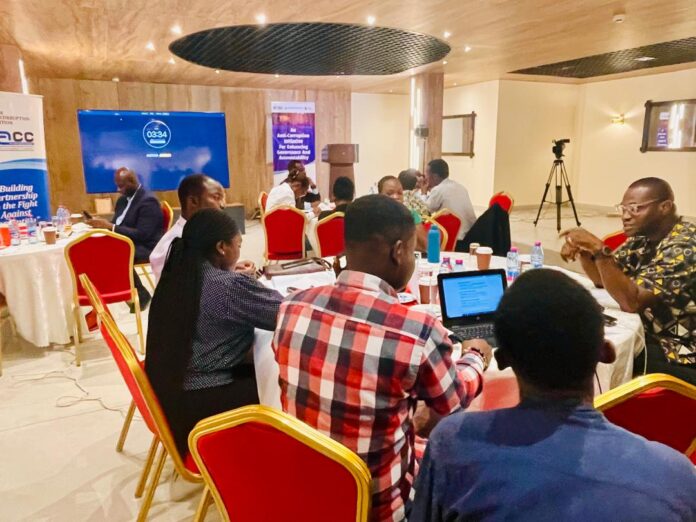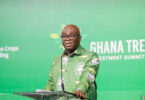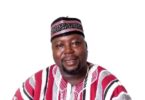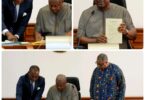Report By: Ishmael Barfi
In a significant move to bolster the fight against corruption, the Ghana Anti-Corruption Coalition (GACC), in collaboration with the Ghana Integrity Initiative (GII) and the African Centre for Energy Policy (ACEP), has organized a one-day workshop aimed at journalists.
This initiative, supported by the Foreign, Commonwealth & Development Office (FCDO), sought to enhance journalists’ understanding of governance and anti-corruption reforms under the project “An Anti-Corruption Initiative for Enhancing Governance and Accountability.”
Addressing participants in Accra, Mrs. Mary Addah, Executive Director of GII, highlighted the crucial role and importance of the media in promoting good governance and accountability.
According to her, the project targets critical issues such as public sector corruption, transparency in public procurement, and citizen participation—factors that impede Ghana’s progress toward the Sustainable Development Goals (SDGs), particularly Goal 16, which focuses on inclusive governance and robust institutions.
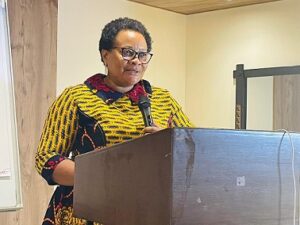
Mrs. Mary Addah, Executive Director of GII delivering her welcome address
To continue to create awareness and ensuring good governance practices, the Executive Director of GII reiterated the necessity for increased media coverage of governance gaps, especially in public budget transparency and service delivery.
Making reference to a 2024 study on Ghana’s public debt crisis, which identifies governance failings and corruption as underlying causes.
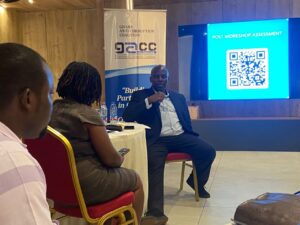
Dr. John Osae-Kwapong, a political science expert during his session
Facilitating the session during the training, Dr. John Osae-Kwapong, a political science expert, provided valuable insights on how journalists can utilize research and data to advocate for transparency in governance.
Acknowledging Ghana’s advancements, such as establishing the Office of the Special Prosecutor, he further highlighted the prevailing public perception that corruption is not being effectively tackled.
Explaining further, he indicated that this perception stems from a lack of visible accountability, with the public often perceiving a disconnect between allegations of corruption and actual consequences.
Therefore he suggested that in some instances, having individuals stepping aside during investigations could strengthen public trust in anti-corruption measures.
Regarding the challenges in the judicial process, the political science expert highlighted that convicting corruption cases often takes 4-5 years, with appeals further prolonging the timeline. This lengthy process underscores the significant obstacles Ghana encounters in effectively combating corruption.
On the topic of institutional independence and democratic integrity, Dr. Osae-Kwapong highlighted Ghana’s recent shift from being a “liberal democracy” to an “electoral democracy.”
He stressed the urgent need for greater independence of institutions, particularly the judiciary, as well as more robust legislative oversight of the executive. Dr. Osae-Kwapong praised the Chief Justice for launching the “Leading Justice Reform” project, which aims to strengthen the judiciary and restore Ghana’s status as a liberal democracy.
RegardingIn his concluding remarks, Dr. Osae-Kwapong urged journalists to act as independent voices, capable of moderating the increasingly polarized discourse. He highlighted the crucial role the media plays in fact-checking and clarifying national issues.
He encouraged journalists to move beyond simply presenting opposing views and to take a stand on factual correctness, positioning the media as essential arbiters in partisan debates. constitutional and local governance reforms, Dr. Osae-Kwapong advised against making immediate amendments unless absolutely essential.
He advocated for reforms that would strengthen local governance by devolving powers from the executive to local governments. This approach, he suggested, would allow for more efficient resolution of local issues without relying on central government intervention.
He emphasized the importance of Parliament fully utilizing its constitutional powers to provide a check on the executive’s authority.
Recent reforms that enable minority parties to chair certain parliamentary committees have significantly strengthened oversight of the executive branch.
Source: www.thenewindependentonline.com


